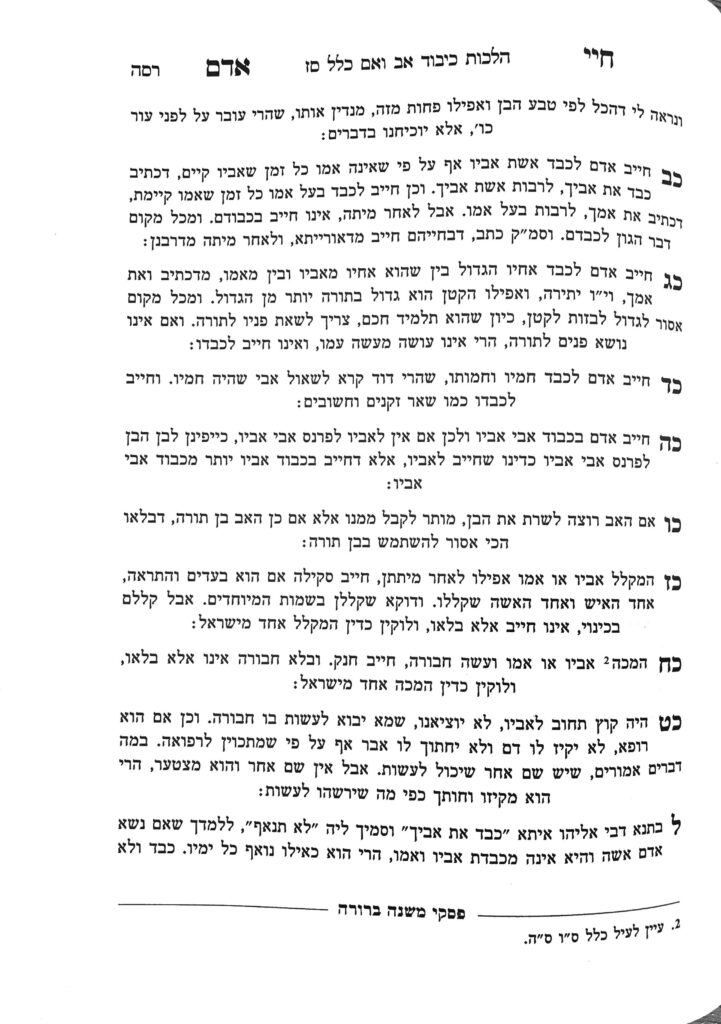We have finished siman 30. The Chayei Adam ends the siman by referring the learner to oisiyos in Sefer Chassidim, where the Sefer Chassidim discusses kibud av v’eim.
In os 568, the Sefer Chassidim writes that if a parent gives a child a list of responsibilities, the task which is most important to the parent should be stated last. The Sefer Chassidim proves from Chazal that the psychology of a person is such that the item which they are told to do last will be done first, because as the last thing mentioned, it remains in their minds.
In os 569, the Sefer Chassidim writes that if a parent knows that their children are argumentative, and will likely fight about the inheritance, the parent should not put them into a situation which will cause them to fight. Rather, they should divide the inheritance while they are still alive, so the children will be unable to fight. Additionally, the parent should make a clear executor, and appoint them in the most legally sound way possible (i.e., witnesses, etc.), so that the children cannot bring any challenges after the parent’s death..
In os 571, the Sefer Chassidim discusses a child who performed kibud av v’eim, but would fight with his siblings. A chacham told the child that they do tremendous kibud av v’eim, but at the same time cause pain to their parents by fighting with their siblings. The chacham suggested to the child to think about the broader context of their actions.
In os 572, the Sefer Chassidim discusses a child who is embarrassed by their father due to inappropriate actions he performs. The Sefer Chassidim writes that it is inappropriate to mention the father’s name in the presence of the child, due to the pain it causes the child to be reminded of their connection.
In the same os, the Sefer Chassidim discusses one who needs to travel through a dangerous area, and whose parents have taken on to fast or are otherwise in tremendous pain due to the danger. The Sefer Chassidim writes that as soon as the child arrives to their destination, they should hire someone to inform the parents that they arrived safely.
In os 584, the Sefer Chassidim discusses a wealthy father who tells his son that if he marries a certain woman, he will give the son a significant amount of money. The son married the woman, but then the father refused to give the money. When the son discussed the issue with father, he taunted his son to take him to court. Although we have learned (shiur 1334) that it would be muttar to take the father to court over the financial loss, the son refused, because he felt it would be inappropriate.
The son’s rav told him that he is doing something tremendous by refraining from taking his father to court. He explained that even if one were to argue that the father is not considered oseh maaseh amcha by reneging on his commitment (and, therefore, the chiyuv kibud av v’eim no longer applies), people will not know the impropriety of the father, and will not understand what the son is doing. Thus, although the son would be halachically allowed to take the father to court, it is praiseworthy for him to refrain.
Summary
- If a parent gives a child a list of responsibilities, the task which is most important to the parent should be stated last.
- Parents should try to prevent arguments over inheritance, even by dividing the inheritance while they are still alive if needed.
- A child should think about whether all of their actions fit the broader context of kibud av v’eim, and not just their direct service to their parents.
- One should refrain from connecting a child whose parent performs improprieties to that parent.
- If one’s parents are concerned about them due to a dangerous situation they are experiencing, they should inform their parents as soon as possible once the danger has passed.
- Although there are situations in which it is muttar to take a father to beis din, it is praiseworthy to refrain from doing so.



